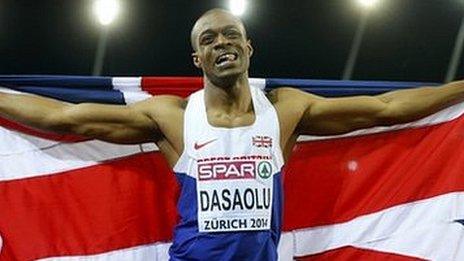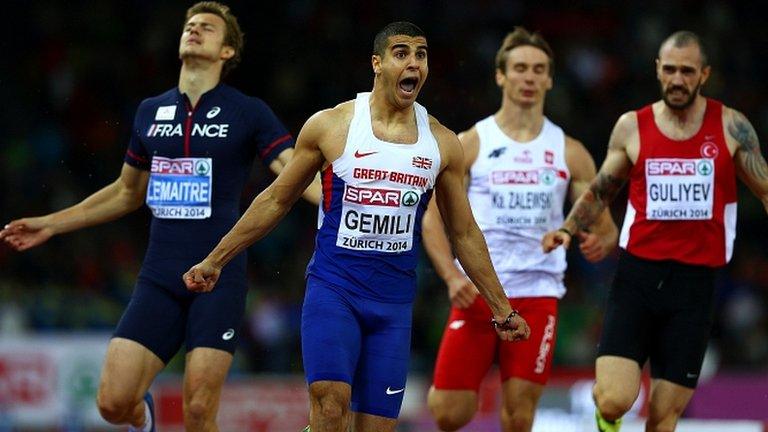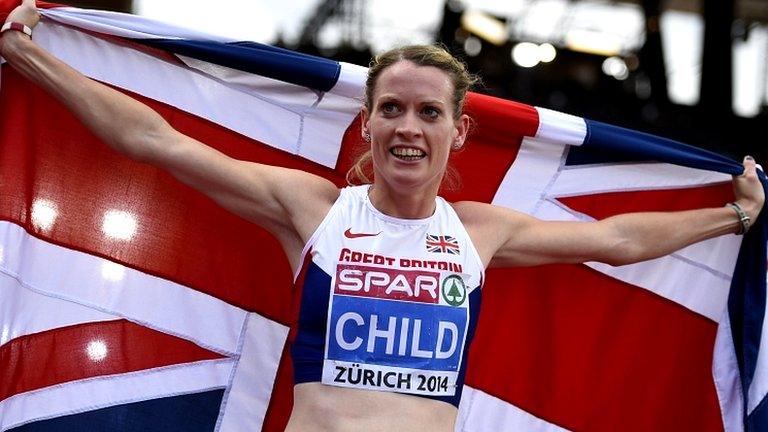European Championships: Farah & Rutherford help GB top table
- Published
European championships: Mo Farah wins 5000m and record fifth gold
British athletes produced a remarkable last-day performance to top the medal table for only the third time in European Championships history with a record-breaking 12 gold medals.
In a breathless two hours in Zurich's Letzigrund Stadium, victories for Mo Farah, Greg Rutherford, the men's 400m relay quartet and both sprint relay teams meant Britain finished with three more golds than they have ever previously managed.
Never before has a GB team won more than nine golds or 19 medals in total, but they will leave Zurich with an overall tally of 23 after an afternoon of unparalleled success.
Farah became the most successful non-relay athlete, male or female, in the championships' long history as he added the 5,000m title to the 10,000m title he won on Wednesday, before Olympic champion Rutherford added the European crown to his collection a fortnight after winning Commonwealth gold.
But it was the performance of the women's 4x100m quartet that was arguably the pick, a team with an average age of 21 being led home by 18-year-old Desiree Henry to smash a national record that had stood for 34 years.
In a glorious six days for British track athletes, the performance of the young sprinters has been outstanding, with five individual medals and now two relay golds.
Newly crowned 200m champion Adam Gemili anchored the men's team as they held off Germany and France, the first time a British men's quartet have successfully got the baton round in six major championships.
European Championships: GB women set 4x100m relay record
And individual gold medallist Martyn Rooney led home the 400m quartet of Conrad Williams, Matt Hudson-Smith and Michael Bingham with a brilliant anchor leg of 43.9 seconds.
The team's winning time of two minutes 58.79 was the third-fastest in championship history and the fastest time by a British squad in 16 years.
Farah's win, perhaps the most predictable of the day, means he now has five European golds - more than compatriots Steve Backley and Colin Jackson or continental legends Fanny Blankers-Koen and Valeriy Borzov.
In a race where only Hayle Ibrahimov dared to take him on, and fellow Briton Andy Vernon claimed bronze, Farah's last lap of 52.23 blew the field away to give him a second European distance double to go with his two golds in a single Olympics and World Championships.
"There have been some down times this year but I've got over it," Farah told BBC Sport.
"Training has gone well in the last couple of weeks and that gave me confidence. History is important to me and it feels great to make my country proud."
Rutherford dominated his long jump final, producing a second round leap of 8.27m to lead over his rivals before extending that to 8.29m in the fourth round.
The expected challenge from Germany's Christian Reif failed to materialise as Rutherford confirmed his status as an indomitable championship performer.
Rutherford said: "It is a real sense of relief because I was seeing how well the British team was doing and everybody was saying to me, 'You have to go out and do it.' I was so pleased I could."
Britain's women's 4x400m team had earlier almost snatched yet another gold as anchor leg runner Margaret Adeoye chased down Ukraine and Russia, only for France's Floria Guei to run a brilliant sub-50 second leg to pip them all at the line and leave Adeoye and her team-mates with bronze.
European Championships: Martyn Rooney leads 400m relay team to gold
And Chris O'Hare took 1500m bronze behind the controversial Mahiedine Mekhissi-Benabbab, who produced a last lap of 52.17 to destroy the field after a slow opening 800m.
It made some amends for losing his 3,000m steeplechase gold after taking his vest off in the home straight.
At the start of the week GB captain Goldie Sayers had urged her team-mates to perform as if this was the last time they would ever compete.
From the first evening, when 40-year-old mother of two Jo Pavey stormed to 10,000m gold, almost all Britain's medal hopes have delivered.
It was not a universally successful display - only one British athlete, male or female, finished in the top seven of a field event final - but it was far better than performance director Neil Black had dared hope.
At the halfway point in the four-year Olympic cycle it leaves British athletics in a bullish mood.

Matthew Hudson-Smith, Michael Bingham, Martyn Rooney and Conrad Williams win 4x400m relay gold

Greg Rutherford leaps to long jump gold - adding European to Olympic and Commonwealth titles

Adam Gemili, Richard Kilty, Harry Aikines-Aryeetey and James Ellington with their 4x100m gold medals

Mo Farah celebrates with twin daughters Aisha and Amani, daughter Rihanna and his wife Tania

Asha Philip, Ashleigh Nelson, Jodie Williams and Desiree Henry make it 12 golds in the 4x100m
- Published17 August 2014

- Published16 August 2014

- Published15 August 2014

- Published16 August 2014

- Published10 September 2015
